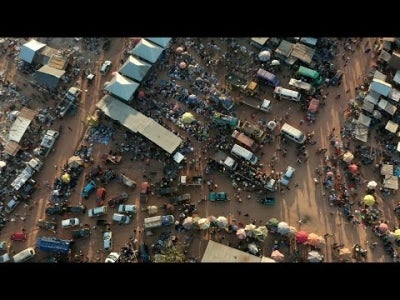
The Nigerian Government has taken an important step towards sustainable waste management, with amendments to national environmental regulations to tackle the country’s growing e-waste problem.
Nigeria is the leading importer of electrical and electronic equipment on the African continent, processing over half a million tons of discarded electronics each year. Approximately 100,000 people work in the country’s electronics recycling sector, providing an important source of livelihoods. However, this comes at a cost, as breaking down electronic equipment releases persistent organic pollutants (POPs) and mercury, harmful chemicals which pose risks to human health and the environment.
Once exposed e-waste processers can suffer a host of health problems, including respiratory and dermatological issues, eye infections, and lower than-average life expectancies. But it’s not just processers who are at risk – POPs and mercury can travel far from their point of release, bioaccumulating in the atmosphere, water and soil, without breaking down in the environment. With traces of electronic waste found thousands of miles away, this makes e-waste a transboundary health concern, reaching as far as the Arctic.
The amended regulations were made possible by the Circular Economy Approaches for the Electronics Sector in Nigeria project, a Global Environment Facility-funded initiative led by the UN Environment Programme (UNEP) and executed by the National Environmental Standards and Regulations Enforcement Agency of Nigeria (NESREA). The project, which provided a detailed roadmap and implementation plan for enforcing the regulations, strengthens Nigeria’s Extended Producer Responsibility (EPR) system, laying the legal basis for its enforcement.
The legislation builds on lessons learnt from past, voluntary EPR schemes, with a focus on ensuring buy-in from producers.
"The revised regulations bind all manufacturers and importers of electrical equipment, e-waste collection centers, and recycling facilities to register with the E-waste Producer Responsibility Organisation Nigeria (EPRON), marking an essential step towards the operationalization of a financially self-sustaining circular electronics network,” NESREA Director General Professor Aliyu Jauro said.
"EPR has been on Nigeria’s waste management agenda since the gazetting of the Regulations in 2009. We are making progress.”
With manufacturers, importers, and retailers now legally and financially responsible for the management of their waste products, the EPR scheme promotes resource conservation and increased recycling, while encouraging manufacturers to design eco-friendly alternatives. Importers are now no longer allowed to import non-functional electronics into the country.
EPRON Executive Secretary Ibukun Faluyi said the organization’s work has been at the heart of the EPR system in Nigeria, adding “the support from key private sector actors such as Hewlett-Packard (HP), DELL, Phillips, Microsoft, and Deloitte has been valuable to this effort.”
“We now need all manufacturers, assemblers, importers, and distributors in the system to come on board and take up their responsibilities to manage the entire lifecycle of their products in an environmentally and socially sound manner,” Mrs. Faluyi said.
“The African Alliance of producers – of which Dell, HP, Microsoft are members – is proud to be a part of the solution, supporting NESREA and EPRON in the successful implementation of the Nigeria e-waste EPR system,” Ruben Janse Van Rensburg, Head of Sustainability at HP’s Africa Office said.
“It is of utmost importance that all obligated parties participate fairly in the e-waste collection and recycling system in order to manage e-waste in a sustainable way.”
To complement the project’s progress on e-waste management, the project has linked EPRON with European producer responsibility organizations to improve their understanding of how fees can be paid and managed to support recycling and the environmentally sound management of e-waste. Livelihoods, working conditions, and health and safety standards for e-waste workers have been improved through trainings and the distribution of personal protective equipment. In addition, UNEP has facilitated regional and global networking and knowledge-sharing events on establishing and operationalizing circular economy approaches that mandate producer responsibility, establishing a basis for the development of producer responsibility schemes across Africa.
“E-waste is growing massively, projected to reach 74.7 million tons globally in 2030," said Eloise Touni, UNEP Task Manager.
“Having the right structures in place now is key for the future. As one of the first middle-income countries in Africa and globally to regulate for mandatory producer responsibility, Nigeria is laying the foundations for the initiative to be upscaled when the project closes next year, blazing a trail for others to follow.”
This article was originally published by UNEP.


